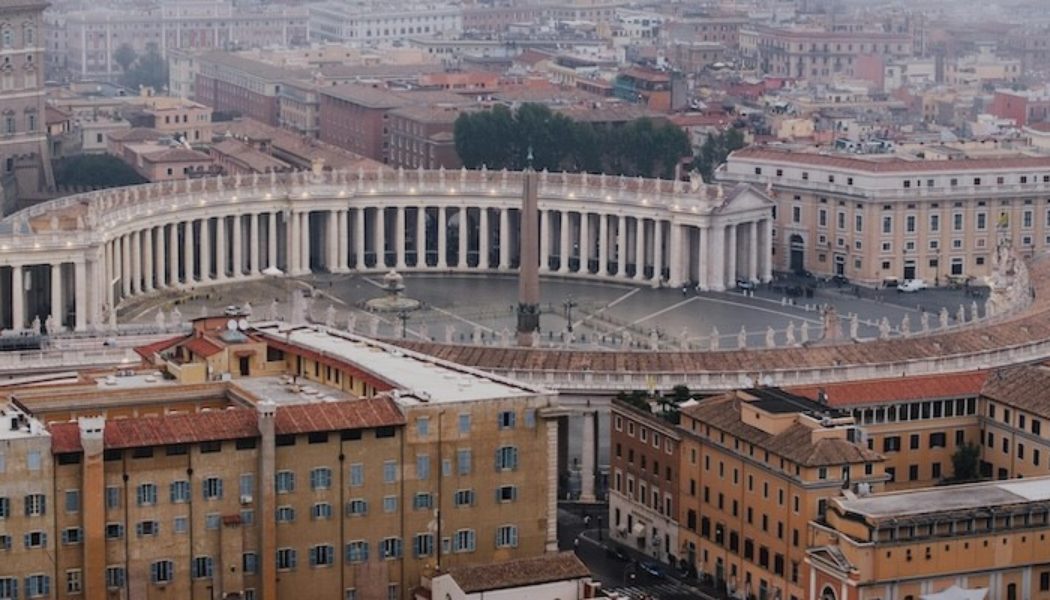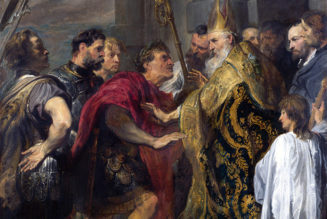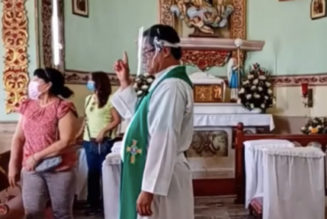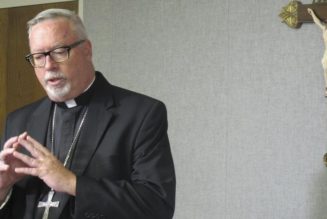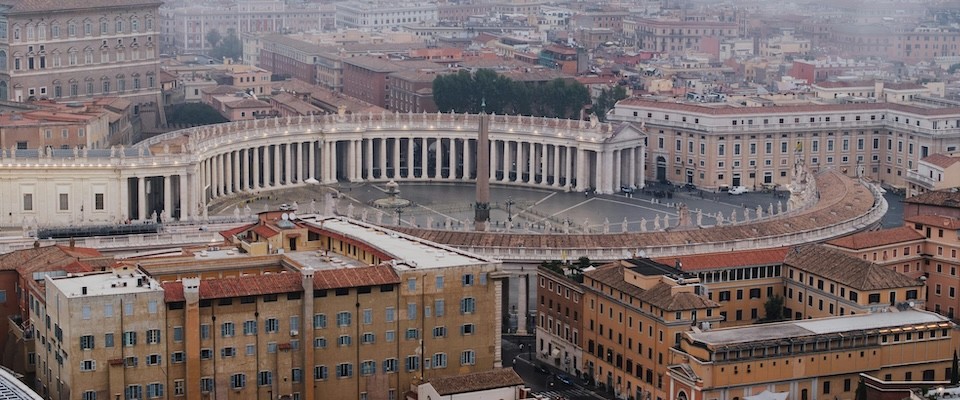
Joseph Ratzinger, better known as Pope Benedict XVI, stepped down from the papal ministry in 2013. But before he did, he began drafting an encyclical on the nature of Christian faith. His goal was to finish his ongoing thoughts on the three theological virtues—faith, hope, and charity—and their implications for true human development. For Benedict, faith was the foundation and informing energy of the other two virtues. And to his great credit, a newly elected Pope Francis adopted Benedict’s draft upon his accession. Francis added “a few contributions of [his] own.” Then he issued the resulting text as Lumen Fidei (“The Light of Faith”), his first encyclical and the inaugural document of his pontificate.
Given later events, it’s telling that some of the new pope’s strongest supporters were less than enthused with the style and content of Lumen Fidei. Understandably so. The text is a classically Ratzingerian work. In his previous roles as a peritus (expert) at Vatican II and as prefect of the Congregation for the Doctrine of the Faith, Joseph Ratzinger was one of the greatest Christian minds of the past century. Lumen Fidei is a tour-de-force reflection on the nature of faith, its role in reason’s search for truth, and its guidance for the Christian life.
That’s the good news. The other news is this: The rich quality of Lumen Fidei stands in unhappy contrast to every other document of the Francis tenure. It’s a painful judgment, but true. And on that point, justice requires some context.
Very few Americans live in the poverty that is common in other parts of the world. Thus, it’s difficult for us to grasp the suffering involved in lives of constant uncertainty. It’s easy—too easy—to dismiss Pope Francis’s hostility to modern capitalism, and the materialist indulgence it breeds, as a form of soft-Marxist ignorance. But his compassion for the poor, his focus on the forgotten people of the world’s peripheries, and his stress on the priority of mercy are not just thoroughly Catholic. They’re also a needed admonition and catechesis for those of us in the self-satisfied “developed” nations. The pope’s obvious distaste for U.S. Church leadership and American Catholic life may be rooted in a lack of knowledge, and it’s deeply frustrating. But his critical attitude toward wealthy nations of the Global North, and especially the United States, is not unwarranted.
In Francis’s defense, we also need to remember that over a lifetime of ministry, a priest will hear thousands of confessions. Many will involve sincere persons struggling with impossibly complex circumstances. Francis is keenly attuned to their burdens. Merely quoting the catechism in such cases offers little solace. It also lacks humanity. The temptation to confirm, or at least to soothe, otherwise well-meaning people in their sinful behaviors and relationships can be intense.
This helps to explain the pope’s frequent complaints about backwardism, rigidity, and “fixism” in Catholic thought. It explains his many criticisms of a purportedly unforgiving clergy. It explains his dislike for “doctors of the law” and his loose approach to canonical issues. It explains his irritation with the intellectual gravitas and precision of his immediate predecessors. It explains his studied ambiguity on certain matters of doctrine and ecclesial discipline. It explains his refusal to live in the Vatican’s Apostolic Palace, his disdain for some of the normal formalities of his office, and his habit of feeding confusion with imprudent, and even provocative, public comments. It also explains his peculiar hostility for the old Latin Mass and the alleged reactionaries who “cling” to it—some of them, yes, bitter backsliders and nostalgia addicts, but others who are merely young persons and families seeking beauty, stability, and some connection with the faith’s past in their worship.
It becomes hard to avoid the conclusion that an undercurrent of resentment is one of the distinguishing and most regrettable marks of the Francis pontificate. Regrettable, because it damages the dignity of the petrine office. Regrettable, because it creates critics and enemies, rather than reconciling them. Regrettable, because it undercuts every pontificate’s central task: providing a credible, faithful source of Catholic unity. And the advisers, apologists, and ghostwriters who surround this pontificate have been instrumental in adding to the problem.
Which brings us to the person of Víctor Manuel Cardinal Fernández. A theologian and former rector of Argentina’s Pontifical Catholic University, Fernández is the former archbishop of La Plata. He is also a close associate, counselor, and sometime ghostwriter in the ministry of Pope Francis, who appointed him prefect of the Dicastery—formerly the Congregation—for the Doctrine of the Faith (DDF). The DDF occupies a special place in the Vatican firmament. It has the task of protecting the integrity of Catholic teaching and practice, a duty vital to the life of the faithful. The reason for its preeminence should be obvious: The Catholic Church is a creedal community as well as a sacramental one. What we believe—about the Eucharist, for example, or the nature and purpose of human sexuality—and how we understand and apply what we believe, constitutes the “glue” that seals Catholics as a distinct people. Fernández thus holds a uniquely important office, just as Joseph Ratzinger did before him. But in his thinking and substance, Fernández is a man very different from his great predecessor.
Much has already been made of Fernández’s controversial 1995 book, Heal Me With Your Mouth: The Art of Kissing. We needn’t revisit it here. It’s not a title one would normally associate with the doctrine chief of the Catholic Church. But dismissing Fernández’s thought as superficial would be a mistake. He has a significant body of work to his credit. His thinking isn’t shallow. It’s simply wrong in some crucial ways, with big implications.
But “wrong” how, exactly? No one has unpacked the problems in Fernández’s thought more respectfully, persuasively, and comprehensively than the Spanish priest and theologian José Granados. The former vice president of Rome’s Pontifical John Paul II Institute for Studies on Marriage and Family—before Pope Francis changed its focus—Granados is superior general of the Disciples of the Hearts of Jesus and Mary and cofounder of the Veritas Amoris Project. Writing in the Winter 2023 issue of Communio: International Catholic Review, Granados methodically assesses Fernández’s understanding of charity and its application to complex moral situations. The article, “‘Charity Builds Up’ (1 Cor 8:1)—but Which Charity? On Víctor Manuel Fernández’s Theological Proposal,” despite the turgid title, makes for essential reading.
Granados notes that Cardinal Fernández stresses the “immediate unavoidable context” of theology. Thus, for the cardinal, circumstances matter greatly, as does doing theology less from theoretical heights and more from concrete human situations. In the words of Granados:
[Fernández] claims that the Christian people, especially the simple and the poor, possess a special insight into the truths of faith, even though they have little speculative or rational power. There are forms of knowledge of God that elude scholars and that simple people are better able to grasp through lived experience of the divine mystery. . . . This appreciation of the people’s context leads Fernández to write that, instead of sensus fidelium [the sense of the faithful], it would be better to speak of sensus populi [the sense of the people]. The reason for this change is that with the expression sensus fidelium the “believers” can see themselves as separate from one another and thus lose the knowledge that comes from their unity as a people. For there are elements of knowledge that are not accessible to the isolated person but only to the person in relationship with the whole culture.
As Granados argues, however, “the expression sensus populi alone is insufficient, since it ignores the centrality of faith.” It carries the risk that “the sociological vision of the people could take precedence over revelation as the foundation for our knowledge of God.” What Fernández actually proposes, in effect, is “not so much a theology of the people but a theology from the people.” This approach contradicts “the true immediate and inescapable context of Catholic theology [given] by the Church as the Body of Christ, which in turn is rooted in the Eucharist and in the network of relationships that the Eucharist establishes.”
Granados goes on to observe that Fernández, “in describing charity, insists that its main external manifestation is to help our neighbors improve their material needs.” But for the Christian, though a person’s material needs are important, they’re not charity’s primary focus. Authentic charity, and its expression in mercy, consists of “helping [others] to live in union with God, which also includes external acts like fraternal correction.” Moreover, “for Aquinas, the virtue of obedience, inasmuch as through it we offer our will to God, is greater than all the moral virtues, including mercy.” We rightly feel compassion for persons locked in sinful situations. But compassion is not a license to minimize, or excuse, or bless the destructive behaviors involved therein.
Granados’s critique of Cardinal Fernández’s theology is more extensive and compelling than can be captured here. But in the end, it demonstrates the inadequacy of Cardinal Fernández’s views, given the actual work demanded of the DDF: to nourish and defend Catholic doctrine and the faith of committed Catholic believers. It also raises uneasy questions about the prudence of appointing him in the first place.
Blaise Pascal, the seventeenth-century Catholic mathematician, scientist, and philosopher, is often remembered for his comment that “the heart has its reasons, which reason does not know.” The human heart is our counterbalance to the brutality of cold logic and truth without love. But it is not infallible. And feelings—including compassion—when they become sovereign in the discernment of moral good and evil, can be dangerously flawed guides. No “new paradigm” or “development of doctrine” can result in an alibi for sin in the light of God’s Word and the wisdom of the Church’s long experience.
The heart does indeed have its reasons. And sometimes they’re wrong.
Charles J. Chaput, a Capuchin Franciscan, is archbishop emeritus of Philadelphia.
Image by Kelly, public domain. Image cropped.
